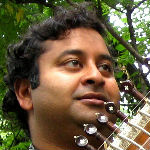 Srinivas is a scholar, translator and musician. He trained in classical South Asian languages and literatures at Brown University and the University of California, Berkeley. His translations from Telugu and Sanskrit include Krishnadevaraya’s Telugu epic Amuktamalyada: The Giver of the Worn Garland and Kalidasa’s play Malavikagnimitram: The Dancer and the King. Srinivas is also a concert sitarist and has given numerous recitals around the world. He now lives in Gujarat and teaches at IIT Gandhinagar.
Srinivas is a scholar, translator and musician. He trained in classical South Asian languages and literatures at Brown University and the University of California, Berkeley. His translations from Telugu and Sanskrit include Krishnadevaraya’s Telugu epic Amuktamalyada: The Giver of the Worn Garland and Kalidasa’s play Malavikagnimitram: The Dancer and the King. Srinivas is also a concert sitarist and has given numerous recitals around the world. He now lives in Gujarat and teaches at IIT Gandhinagar.
Abstracts of the lectures
Travellers’ accounts on Indian society: (1) The Portuguese
This lecture will explore various descriptions of Indian society, trade and governance as penned by Portuguese travellers, particularly the accounts of Domingo Paes and Fernao Nunes who spent considerable time at the Vijayanagara court in the sixteenth century. In addition we will corroborate this evidence with Krishnadevaraya’s own depiction of the Vijayanagara state. Lastly we will contrast these descriptions with the earlier account of Vasco da Gama’s first landing in Calicut in 1498 to evidence an evolution in the Portuguese perception of Indian culture and social structures.
Indian society seen through the Bhakti movement
With its roots in South India, the complex trajectories of the medieval bhakti movement spread throughout the entire subcontinent in a variety of modes and forms. Poets, bards, singers and musicians from all classes of society were contributing to a new way of expressing religious devotion that often involved a critique of normative social structures. We will explore a range of bhakti poets from Andal to Mira and Kabir to Bulle Shah in an attempt to sketch out the diverse ways in which these poems reflect a revolution in Indian social thought, language, religion and politics.
Indian society seen through folk and other storytelling traditions
India boasts one of the richest stock of stories in the world. In both classical and folk forms, the katha tradition has evolved for millennia in remarkable variety of forms, genres and modes. This lecture will explore classical texts like the Brhat Katha and Pañcatantra alongside regional folk epics as they converse with the vast world of performative oral storytelling that pervades every region of the subcontinent. We will read and listen to these stores as reflections of deep societal concerns and attempt to understand how they both reinforced as well as questioned normative social structures.
Readings
- “Tale of the Untouchable Devotee from Kṛṣṇadevaraya’s Āmuktamālyada”, Sagar: A South Asia Research Journal, Spring 2014, Volume 22, pp. 2-41.
- “Make It Telugu: Legitimizing Author, Patron and Text” in Agency and Patronage in Eastern Translatology, Newcastle: Cambridge Scholars Publishing, 2015, pp. 127-142.